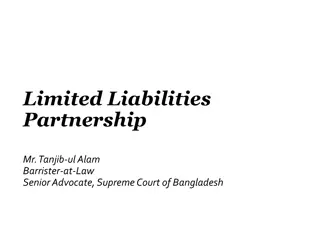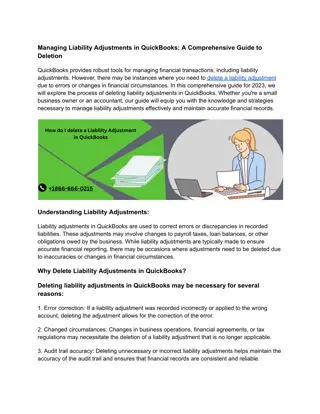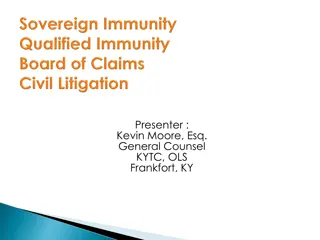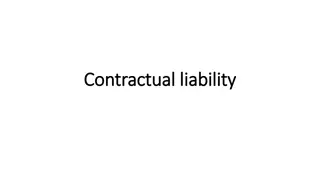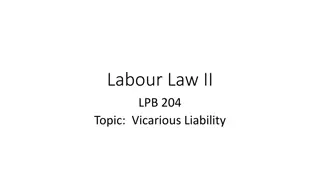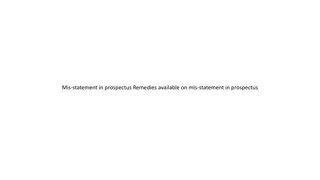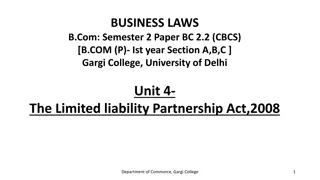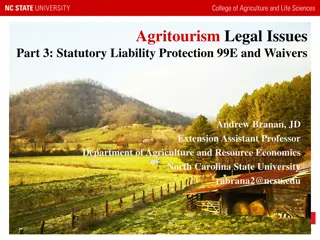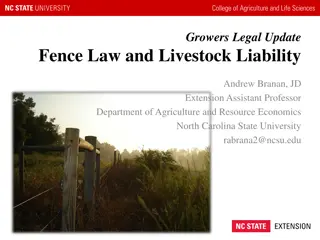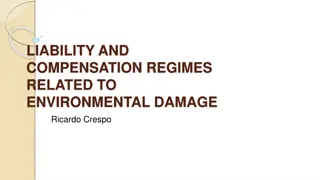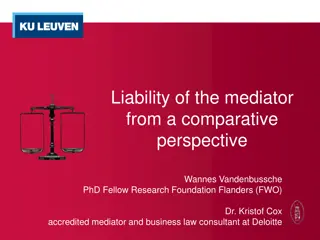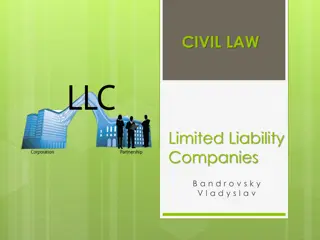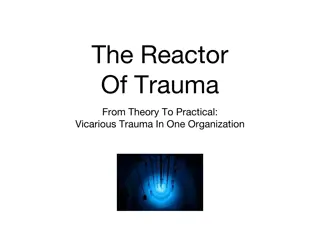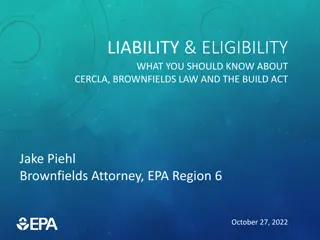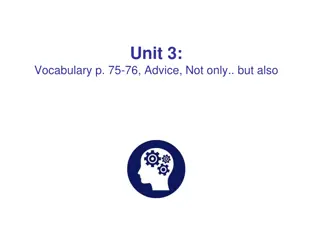Understanding Vicarious Liability in Legal Relationships
Vicarious liability involves holding one party legally responsible for the wrongful actions of another. This liability applies to relationships such as master-servant, employer-independent contractor, principal-agent, and firm-partners. The basis of a master's liability for a servant's actions can be justified through theories like respondeat superior, power of selection, power of control, beneficiary of services, distribution of loss, and public policy.
Download Presentation

Please find below an Image/Link to download the presentation.
The content on the website is provided AS IS for your information and personal use only. It may not be sold, licensed, or shared on other websites without obtaining consent from the author. Download presentation by click this link. If you encounter any issues during the download, it is possible that the publisher has removed the file from their server.
E N D
Presentation Transcript
Issues to be Discussed Definition of vicarious liability Vicarious liability of master and servant Vicarious liability of employer and independent contractor Vicarious liability of principal and agent Vicarious liability of firm and partners
Vicarious Liability Vicar means who performs the functions of another, a substitute. Accordingly, vicarious liability means liability for wrongs committed by another person. Normally, a person is held liable only for wrongs committed by him but sometimes he may be held liable for wrongs committed by another person. For example, Master for the acts of servant Principal for the acts of agent Owner of a firm for the act of his partner a) b) c)
Basis of Masters Liability for acts of Servants There are different theories that have been formulated for justifying the master s liability for the acts of his servant. a) Respondent superior b) Nam qui facit per alium facit per se c) Power of selection d) Power of control e) Beneficiary of Services f) Distribution of Loss g) Public Policy
Basis of Masters Liability for acts of Servants a) Respondent superior: This maxim means let the superior or principal be liable. This maxim presumes that, the acts of servant are done by him under express or implied commands of the master and are, therefore, acts of master. He is, therefore, liable for all acts done during the course of his employment. b) Nam qui facit per alium facit per se: The maxim means that he who does an act through another is deemed in law to do it himself. When a servant does something during the course of employment according to this principle, he does it under express or implied command of his master.
c) Power of Selection: One of the justifications for masters liability is that, the maser can exercise care in selecting the efficient and competent hands. If he selects incompetent persons, he must suffer for his neglect of duty. d) Power of Control: Vicarious liability is more often justified on the basis of control. The master can punish the servant or remove him from service if he proves to be incompetent and causes damage to others by his negligence. The master has also opportunity in most of the cases to control the manner of the work done by the servant and at least he has a right to control his activities.
e) Beneficiary of Services: The liability is also justified on the ground that the master reaps the benefits of the services of his servant and therefore the losses should also be borne by him. f) Distribution of Loss: Imposition of liability on the master for torts of his servants also helps in spreading over the loss and in distributing it among the beneficiaries of the activity. g) Public Policy: The vicarious liability of master for acts of the servant is also justified on vague concept of public policy.
Who is a servant? The expression servant has technical meaning. There are four essential elements of master and servant relationship. Consideration of these elements helps in determining the relationship in a particular case: a)The master s power of selection of a servant. b)Payment of wages or other remuneration. c)Right to control the method of doing work. d)Right of suspension or dismissal.
Course of Employment An act is deemed to be done in the course of employment if it is an authorized act or its natural consequence or is an unauthorized mode of doing some act authorized by the master or it necessarily incidental to something which the servant is employed to do. Thus a tort will be treated within the course of employment if it falls within any of the following categories: a) Authorized acts and their natural consequences. b) Unauthorized modes of doing authorized acts. c) Incidental acts.
Authorized Act and Their Natural Consequences: If a wrongful act is expressly or impliedly authorized by the master he is liable for any injure caused in consequence of it. If a master authorized a servant to trespass on the land of another or to throw dirt at the door of the plaintiff and commit nuisance thereby the master will be liable to pay damages. Negligent Exercise of Authorized Acts: Where damage is caused because of negligent mode of doing an authorized work the master cannot escape liability. Mistake of Servant: If the wrong is committed by the servant under some mistake of the fact, the master will generally be liable. Fraudulent acts done by servant for his own benefit: The servant's act does not cease to be in the course of employment merely because the act is done for servants own benefit and against the interest of the master.
Willful Disobedience of Instructions: The master will be liable even if the servant willfully disobeys the instructions given by the master as to the manner of doing a work. Lift to Unauthorized Passengers: On this point, the decisions of the Court were not uniform. The master may or may not be held liable depending upon the facts and circumstances of each case. Deviation: At the time of Commission of tort the servant must be on the master's business. If the servant deviates from the path suggested by the master he does not thereby cease to be in the course of employment. But where he goes on a frolic of his own without being on his master's business, the master cannot be held liable. Delegation of his duties by servants: Where a servant delegates his duties to another person, the master will be liable for wrongs committed by the delegatee if the servant has authority from his master to delegate. But the master will not be liable for unauthorized delegation .
Lending of servant: When a servant is temporarily lent to some other person the question naturally arises as to who should be held liable for his acts or omissions (the original master or the person to whom his services have been lent temporarily). The answer will depend upon the question in whose employment he was at the time of commission of the tort. Liability for criminal acts: Though there is nothing like vicarious liability in criminal proceedings yet it is well established that in a civil action master can be liable for servant's act done in the course of employment even if the servant's act amounts to crime. Incidental Acts: Where the servant done something which is necessarily incidental to acts for which he is employed and while doing so commits some accident whereby damage happened to the plaintiff, the master will be liable.
Exception to the rule that the master is liable for servants acts done during the course of employment: There are two types of exceptions: a) Where the master will be liable even if the act was not within the course of employment; b) Where the master will not be liable even if the act was done during the course of employment. Where master is liable for acts not done in the course of employment: Where a servant is injured due to defect in some unfenced machinery and the accident could not have happened had the machinery been properly fenced, the master will be liable. The question whether he was at the time of accident within the course of employment or was engaged in frolic of his own is irrelevant because master is under duty to get them property fenced.
Where master is not liable for acts done in course of employment: Normally, the master is not liable for torts which are not committed in the course of employment, but he is liable if the tort is committed in the course of employment. However, in the following exceptional cases, master is not liable even where the tort is committed in the course of employment: Employment of servant under compulsion: Where the master has to employ a particular person under compulsion and has no choice of selection, the master will not be liable for negligent acts of such servant even if done during the course of employment. Sovereign Immunity: The Government is not liable as an employment for torts committed by its servants in exercise of sovereign functions. Doctrine of common employment: A master was not liable for tort committed by a servant against his fellow servant. The servant has better opportunities of watching the conduct of the fellow servant.
Employer and Independent Contractor Liability for torts by independent contractor :As a general rule, an employer is liable for torts committed by his servants during the course of employment, but he is not liable for torts of his independent contractors. Exceptions are as follows: Personal fault of the employer: Where an employer employs an incompetent contractor and he causes damage because of his incompetence, the employer is also liable for such damage as it may be attributed to neglect of duty on his part to employ a competent contractor. Unlawful job: Where an independent contractor is employed to do something which in itself is unlawful he cannot escape liability. Extra hazardous work and Non-delegable duties: A master will be liable for acts of an independent contractor if strict liability is imposed due to extra hazardous nature of work or where duty is non-delegable.
Principal and Agent The law with regard to liability of the principal for acts of his agents rests on the same principles of that of a master and a servant. A principal can also be liable for acts of his agents in the following cases: Authorized acts: A principal is always liable for any tortious act which he himself authorized the agent to do. b) Ratification by Principal: Even where a tortious act was not authorized by the principal he will be liable if he later on ratifies the act. Acts within the scope of authority: The principal is liable for all acts of his agent done within the scope of his authority even if they were neither authorized nor ratified by the principal. For all acts which are not authorized or ratified by the principal he would not be liable if the act was not done by the agent acting within the scope of the authority. a) c)
Firm and Partners The relationship between partners inter se is that of principal and agent and, therefore, every partner is liable for torts committed by any of the partners in the management of the business of the firm. In Hamlyn v. Houston & Co. (1903) one of the two partners bribed the clerk of the plaintiff who was a competitor of the firm to disclose certain confidential information in respect of the plaintiff s operations. Both the partners were held liable for damages to the plaintiff because in the ordinary course of business such information were obtained but by legitimate means.
Class Activity Answer to the following question. (15) You have employed a servant cum care taker who have done a multiple job (driving, marketing, taking care of your home) for you. On a vacation he came up with his friend who is helping him in his works. One day, both of them negligently ran over a puppy of your neighbor. The neighbor filed a suit against you. Who will be liable and why?
Communication Blended Learning Center Enrolment Key: tortfsummer20 Google classroom Code: Section A quev2ib Section B jefuydj Facebook Page: Ferdousi Begum E-mail: ferdousi@daffodilvarsity.edu.bd Mobile: 01839789058 What s app : +8801839789058


